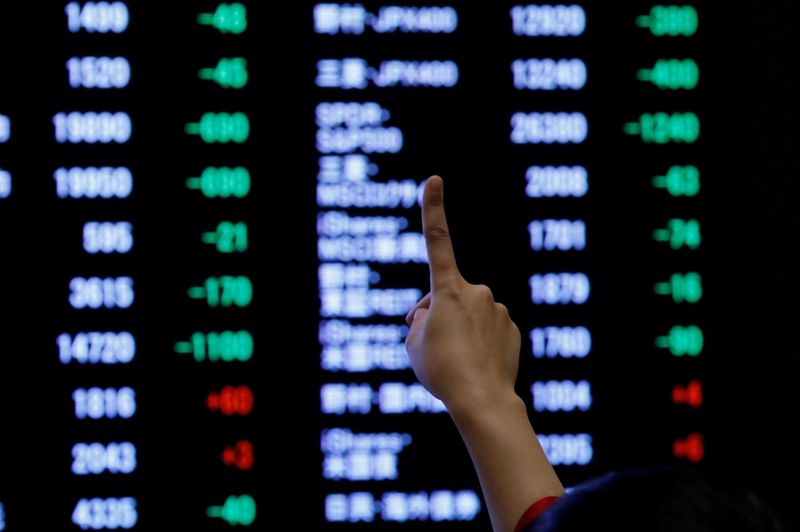By Tommy Wilkes
LONDON (Reuters) - World stocks set new record highs on Friday and the prices of safe-haven assets such as gold pulled back as investors cheered an apparent de-escalation in U.S.-Iran tensions and looked instead to prospects of improved global growth.
Markets have swiftly reversed the sharp falls seen at the start of the week after the United States killed Iran's most senior general, believing it would not lead to a full-scale military confrontation that would rock investor confidence.
The MSCI world equity index (MIWD00000PUS), which tracks shares in 49 countries, has quickly resumed its rally and added another 0.1% on Friday to hit a new record high. It is almost 1.5% above the lows seen on Monday.
European shares were mixed at the open, with pan-European Euro Stoxx 50 (STOXX50E) down 0.16%, the German DAX (GDAXI) up 0.06% and Britain's FTSE (FTSE) 0.1% ahead.
That followed record levels in the three major share indexes on Wall Street on Thursday. Stock markets have got off to a strong start in 2019 despite U.S. President Donald Trump's decision to kill military commander Qassem Soleimani, the second most powerful figure in Iran, in a missile strike in Baghdad.
FULL CIRCLE
"In the space of a few days we appear to have swung full circle; with investors seemingly convinced that the problems in the Middle East appear to have settled down, at least for the time being," said Michael Hewson, chief markets analyst at CMC Markets.
"Investors now have the opportunity to focus on the signing of the new U.S.-China phase one trade deal next week, as well as the health of the U.S. economy today, and in particular the labour market which has continued to look resilient," he added, referring to all-important U.S. non-farm payrolls data due at 1330 GMT.
While markets judge the United States and Iran to be making moves to defuse the tensions, investors also welcomed news that sales of Apple's iPhones in China in December jumped more than 18% on the year.
Investors digested the report as a prelude to the upcoming visit by China's Vice Premier Liu He, head of the country's negotiation team in Sino-U.S. trade talks, to Washington next week to sign a trade deal with the United States.
There were other signs of investors' bullish mood too.
MSCI's emerging market currency index (MIEM00000CUS), although little changed on Friday, hit 1-1/2-year highs on Thursday in what is likely to be its sixth straight week of gains as it has also benefitted from three U.S. rate cuts last year.
Safe haven assets extended their downward move.
Gold
Against the Japanese yen, which investors often buy in times of uncertainty, the U.S. dollar strengthened to a two-week high of 109.61 yen
The dollar was little changed more broadly (DXY) and against the euro it stood at $1.1108 (EUR=). The euro fell to $1.1091 on Thursday, its lowest in about two weeks.
Oil prices, which spiked earlier this week on worries that tensions with Iran would disrupt global supplies, retreated further.
Brent crude (LCOc1) fell 0.3% $65.20 a barrel, and was heading for its first decline in six weeks, down almost 5%.
U.S. crude oil (CLc1) dropped 0.4% to $59.33 a barrel and was also on track for its first weekly drop in six, falling 6% from last Friday's close.
Government bond yields, which rose on Thursday as investors' nerves about the situation in the Middle East eased, edged lower in early trading on Friday.
The benchmark 10-year German bond yield (DE10YT=RR) fell 1 basis point to -0.236% but for the week remains up almost 5 basis points, in a strong signal of investors' willingness to pull back from safe-haven government debt for riskier assets.
The 10-year U.S. Treasury yield (US10YT=RR) slipped 1 basis point to 1.849% but it too remains up 6 basis points on the week.
"Unless we have external shocks such as a resurgence of U.S.-China trade tensions or a war in the Middle East, it is hard to see the U.S. economy falling apart," said Hiroshi Watanabe, senior economist at Sony Financial Holdings.

"There could be a great rotation to stocks from bonds. Emerging markets are likely to benefit from investors' bullish mood too," he added.